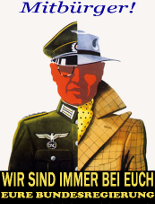Eine Art von Sieg

Was will Putin? Ich darf die geschätzte Leserschaft auf ein höchst aufschlussreiches Interview mit Sergey Karaganiv aufmerksam machen (deutsche Übersetzung im Tagesspiegel). Zusammenfassung mit Kommentar:
1. Es war ein Krieg mit Ansage. In 2008 President Putin said that if Ukraine’s membership of the alliance became a possibility then there will be no Ukraine. He was not listened to. So the first objective is to end Nato’s expansion. Die Ukraine hat seit 2019 in der Verfassung, der EU und der NATO beitreten zu wollen. Sie waren also gewarnt.
2. …there are people in the Russian government concerned with the rise of ultra-nationalism in Ukraine to the extent that they think it is beginning to resemble Germany in the 1930s. There is also an aim to free the Donbas republics of eight years of constant bombardment. Daher das Framing „Entmilitarisierung“ und „Entnazifizierung“. Das ist natürlich Unfug und kein Grund, einen Krieg zu starten. Die Ukraine war und ist ein failed state, regiert von einer Kleptokratie wie auch Belarus, nicht zu vergleichen mit Hitler-Deutschland, und wäre mitnichten in der Lage, Russland anzugreifen, auch nicht als NATO-Staat. Letztlich geht es darum, die Separatisten im Donbass zu legitimieren.
3. Karaganiv meint, man habe vermutlich einem Krieg auf russischem Territorium zuvorkommen wollen. Das hätte man auch anders erreichen können: Wenn das russischen Modell des Kapitalismus attraktiv wäre für die Bewohner der Ukraine, wären sie sicher selbst auf die Idee gekommen, sich der ehemaligen Sowjetunion anzunähern. Außer der Sprache, die von den ukrainischen Nationalisten gewaltsam unterdrückt wird, gibt es aber nicht viel, warum Russland dem „Westen“ vorzuziehen wäre.
4. … I think it will involve the partition of Ukraine, one way or another. Hopefully there would still be something called Ukraine left at the end. But Russia cannot afford to “lose”, so we need a kind of a victory. Das ist natürlich ein weites Feld. Immerhin gibt Karaganiv zu, dass Teile der russischen Elite vermuteten, die Ukrainer würden den Einmarsch irgendwie unterstützen. Mit dem Rückzug de Russen von Kiew hat sich das Thema zunächst erledigt.
5. I also know from the history of American nuclear strategy that the US is unlikely to defend Europe with nuclear weapons. But there is still a chance of escalation here, so it is an abysmal scenario and I hope that some kind of a peace agreement between us and the US, and between us and Ukraine… Das sieht nicht so aus, die Gefahr einer direkten Konfrontation zwischen Russland und der NATO ist also auch aus Sicht der Russen nicht gebannt. Und da man nicht weiß, wie weit die westliche Hysterie und um welchen Preis die Oligarchen der Ukraine und ihre Marionette Selenskij den „Westen“ in einen Krieg hineinziehen würden, bleibt das Szenario einer atomaren Apokalypse bestehen.
6. Poland will gladly take back some of parts in the west, maybe Romanians and Hungarians will, too, because the Hungarian minority in Ukraine has been suppressed along with other minorities. But we are in a full-on war; it is too hard to predict. The war is an open-ended story. Bemerkenswert, dass Karaganiv davon spricht, es handele sich um einen full war und die offizielle Sprachregelung von eine militärischen „Spezialoperation“ nicht übernimmt. Natürlich gibt es auch in Polen und in Ungarn ultranationalistische Kräfte, die die ehemalige Gebiete wiederhaben wollen, aber die Polen wären schön blöd, sich diesen Klotz ans Bein zu binden.
6. If you asked me how I would describe Russia in one word, it is “sovereignty”. We defeated those who sought to rule us, starting with the Mongols, and then Carl [Charles XII] of Sweden, then Napoleon and Hitler. Also, recently, we had years of Western domination here. (…) And nevertheless, you see what has happened: Russia revolted against all that. Das ist so irrational wie die Deutschen, als beriefen sie sich auf „die Germanen“ als ihre Vorfahren oder auf das das „Deutschland“ im 13. Jahrhundert. Auf den Mongolensturm könnten sich auch die Ukrainer berufen, da es auch um Kiew ging. Gleichzeitig argumentiert Karaganiv: And Siberia is at the core of the Russian empire: without Siberia, Russia wouldn’t have become a great country. Von einem Sibirien als Teil Russlands kann man aber frühestens im 17. Jahrhundert sprechen.
7. I think the biggest loser will be Ukraine; a loser will be Russia; a great loser will be Europe; the United States will lose somewhat, but still it could very well survive as a huge island over the ocean; and the big victor is China. I told you so.
8. Russia will win, whatever that victory means, and second, because we have a strong and tough regime, so in any event, or if the worst happens, it will not be the dissolution of the country or collapse. I think it will be closer to a harsh authoritarian regime than to the dissolution of the country. But still, defeat is unthinkable. Eine Niederlage ist undenkbar? Das erinnert mich an einen anderen größten Feldherrn aller Zeiten. Wenn er sich da mal nicht täuscht. It’s the economy, stupid!

Kommentare
6 Kommentare zu “Eine Art von Sieg”
Schreibe einen Kommentar



















„Ruble stronger than before Ukraine crisis:
The Russian ruble strengthened to 75 rubles to the US dollar and 81 against the euro on Thursday, reaching its strongest levels against major currencies since February 19.
(…)
Another factor in favor of the ruble was the announcement by the Bank of Russia on March 25 that the regulator is resuming gold purchases at a fixed price of 5,000 rubles ($52 at the time) per 1 gram between March 28 and June 30. The move effectively links the ruble to gold, and since gold trades in US dollars, this sets a floor price for the ruble in terms of the dollar, establishing a new exchange rate between the two currencies closer to the levels seen on Thursday.“
(Quelle: RT)
Hier noch ein Kommentar des Panzermuseums Munster. https://youtu.be/8Ls399CAAkw
Für mich liest sich das Interview wie nackte Angst. „…still defeat is unthinkable“, und warum?
Das ist für mich die entscheidende Stelle:
„And if there is a sense that we are losing the war, then I think there is a definite possibility of escalation. This war is a kind of proxy war between the West and the rest – Russia being, as it has been in history, the pinnacle of “the rest” – for a future world order. The stakes of the Russian elite are very high – for them it is an existential war.“
Es spielt überhaupt keine Rolle ob die russische Führung im Wahn ist oder nicht, wer sich in einem „existential war“ glaubt, geht auf das Ganze.
Gerade Deutsche sollten das wissen, wie sonst will man die völlig sinnlose Verlängerung des Krieges nach Stalingrad und insbesondere nach dem D-Day erklären?
Und nein, die Economy bestimmt lediglich, wie lange du halbwegs zivilisiert Krieg führen kannst, danach wird es hässlich. Und mit 6.000 Atomsprengköpfen kann man den Planeten unbewohnbar machen, aber keinen „existential war“ verlieren.
@BEX
Vielen Dank für das Video. endlich habe ich im weltweiten deutschen Internet mal jemanden gefunden, der das genauso sieht wie ich.
es wäre hilfreich, wenn alle in deutsch schreiben würden, nicht alle sind so „hochelbisch“ „gebldet“.
Strengt nur an sowas zu lesen.
ansonsten ok auf russisch geht auch, kyrillisch ist doch leicht zu lesen und jeder Ossi kanns.
Und die Menschen in Russland haben nun auch Videos über den Krieg, wie er nun einmal ist, die eine russische Nation nur gewinnen lassen können.
Marx 300 % Gewinn.
Die inzwischen ungebildete, arrogante, sich befugt nennende und alles wissende berliner Innenringgesellschaft hat schon Fontane mit seinen Götzenanbetern erkannt, wir werden genau das, was die USA (Imperialisten) wollen.
@ Die Anmerkung
Keine Ursache ;-)